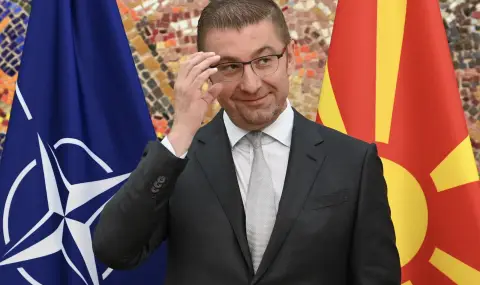Today at noon, the session of the Parliament of the Republic of North Macedonia continues, at which the deputies will have to vote on the country's government, proposed by Hristijan Mickoski, by midnight at the latest. Yesterday, the holder of the mandate to form a government presented his priorities, and the opposition sharply reacted to the fact that the pre-election promises of VMRO-DPMNE are not present in the cabinet's program.
„According to the information we have, the situation in several areas is close to clinical death, the institutions are collapsing. We will respond decisively and the public will be informed of everything. I will not ask for a 100-day honeymoon, but I am announcing investments right away, as early as Tuesday, an investment of over 400 million euros, then a tax cut and an increase in pensions”, Hristiyan Mickoski said in the plenary hall.
In his words, the government will remain committed to European integration and will work to harmonize policies with European standards, advancing towards the goal of full membership in the European Union.
However, according to the opposition, there is a serious discrepancy between the program of the future government and the pre-election promises. In his statement, the coordinator of the parliamentary group of the SDSM, Oliver Spasovski, stated that the declared priority for EU integration is different from the “concept of VMRO-DPMNE in recent years”, that in the program, “there is no word about canceling the Prespa Treaty or terminating it of the Agreement with Bulgaria”.
The fact is that there is no plan on how you will change the negotiation framework, which years ago you said you would not accept”, Spasovski stated.
The projects included in the government's program were also criticized, which, according to the opposition, do not have a deadline for implementation and financial argumentation, and the contract with the consortium of "Bechtel" and "Enka" for the construction of Corridors 8 and 10-D, which VMRO-DPMNE sharply criticized, is part of the government's program.
In the pre-election period, VMRO-DPMNE stated that citizens are their focus, but did not give a concrete answer as to what will happen to their salaries, to their purchasing power in 2028, the criticism of the former vice-prime minister for economic affairs in Dimitar's government Kovachevski Fatmir Bitichi.
The Left attacked the program, claiming that the only part that deserves attention is actually copying the program of the Left itself, and the personnel capacity of the future government is weak.
Claims were heard in the hall that the program did not mention the loan of 1 billion euros, which Mickoski announced was contracted government to government, at a low interest rate, and with whom and for what it will be used he will say , after the government is voted, that the future ministers of ZNAM, which declares itself a left-wing formation, actually stand behind right-wing measures, that this is the government with the largest number of ministers, with the fewest women in it, that for the strategic interests of country, it is hypocrisy for a ministerial candidate to be a follower of Putin's regime.
"It will take an extraordinary effort and public support to get the country back on track. Mickoski will have a difficult task. We have a country dominated by corruption and inflation, which must be transformed into a new, normal country with economic and legal security," said Antonie Miloshoski from VMRO-DPMNE.
According to the Rules of Procedure of the Parliament, the meeting to discuss the program and the composition of the government of North Macedonia can last for a maximum of two days, and the voting must end at midnight tomorrow at the latest. The government will be elected if the majority of the total number of deputies vote for it.
The parliamentary majority expected to support the new government in the legislature is 78 MPs.
In the new government, proposed by Prime Minister Hristijan Mickoski, there will be 24 members, 20 of them with portfolios. As prime minister, Hristian Mitskoski will have five deputy prime ministers.
